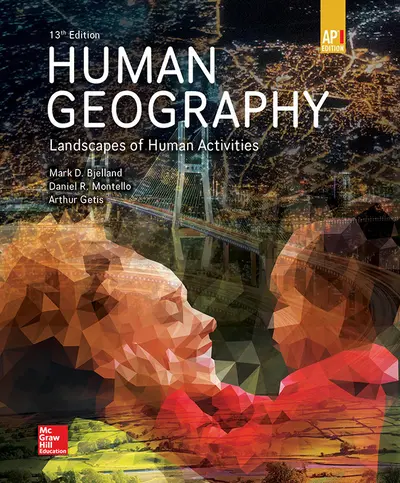Mark D. Bjelland
Mark Bjelland received his B.S. and M.S. degrees from the University of Minnesota and University of Washington, respectively. He worked for six years as a consultant on transportation systems in Minneapolis–Saint Paul, water management in Washington State, environmental cleanups on First Nations reservations in British Columbia, Canada, and major urban redevelopments in Vancouver, British Columbia. Intrigued by the geographical questions he encountered in his work, he earned a Ph.D. in geography from the University of Minnesota. He wrote his dissertation comparing deindustrialization, environmental justice, and brownfields redevelopment in the United States and Canada.
He is a professor of geography at Calvin University, where he has taught for six years, after 15 years at Gustavus Adolphus College. He has been a visiting scholar in the geography department at the University of British Columbia, received a Fulbright Foundation German Studies award to study urban planning in post-reunification Germany, and was awarded a U.S.-U.K. Fulbright Scholar Award to spend a year at Cardiff University in Wales researching the redevelopment of derelict industrial land and the creation of eco-communities.
He loves to take geography students into the field, and in addition to local field trips to farms, small towns, and cities, he has led field courses to the Pacific Northwest, Hawai’i, and Europe. His research interests include urban and economic geography, environmental justice, urban sustainability, and religious diversity. His interests have been reflected in book chapters and articles published in The Professional Geographer, The Geographical Review, The Encyclopedia of Geography, Research Journal of the Water Pollution Control Federation, Urban Geography, and elsewhere. He is a co-author of McGraw-Hill’s Introduction to Geography.
Daniel R. Montello
Daniel R. Montello received his B.A. degree from the Johns Hopkins University and his M.A. and Ph.D. degrees in environmental psychology from Arizona State University. He was also a postdoctoral fellow at the University of Minnesota and a visiting professor at North Dakota State University. He is currently professor of geography and affiliated professor of psychology at the University of California–Santa Barbara (UCSB), where he has been on the faculty since 1992.
Dan teaches graduate and undergraduate courses in human geography, behavioral geography, cognitive science, statistics, research methods, cognitive issues in cartography and GIS, and environmental perception and cognition. His research is in the areas of spatial, environmental, and geographic perception, cognition, affect, and behavior.
Specific research topics he and his colleagues have investigated include how people navigate in built and natural environments, how people find and lose their way, how children and adults develop an understanding of space and place (including how they acquire and use distance and direction knowledge), how people perceive and reason with maps and other visualizations, how people express their experience of place and space in language, how individuals and groups of people are similar and different in spatial thinking, how spatial relations interrelate with social relations, how people and information systems conceptualize geographic reality, and how human psychology relates to aspects of Earth science (including climate science and geology).
Dan has coauthored or edited six books, including 2006’s An Introduction to Scientific Research Methods in Geography by SAGE Publications, with Paul C. Sutton, and 2018’s Handbook of Behavioral and Cognitive Geography by Edward Elgar Publishing. He and his co-authors have also published around ten articles and book chapters.
Dan is currently co-editor of the academic journal Spatial Cognition and Computation and sits on the editorial boards of Environment and Behavior and the Journal of Environmental Psychology. He has served as a reviewer for several funding agencies around the world and more than 50 academic journals in the fields of geography, cartography, geographic information science, psychology, education, cognitive science, computer science, anthropology, communication, economics, and planning. He is a member of the Association of American Geographers, the Psychonomic Society, and the Sigma Xi Scientific Honor Society.
Arthur Getis
Arthur Getis received his B.S. and M.S. degrees from Pennsylvania State University and his Ph.D. from the University of Washington. He is the co-author of several geography textbooks, as well as two books dealing with map pattern analysis. He has also published widely in the areas of urban geography, spatial analysis, and geographical information systems. He is coeditor of Journal of Geographical Systems and for many years served on the editorial boards of Geographical Analysis and Papers in Regional Science. He has held administrative appointments at Rutgers University, the University of Illinois, and San Diego State University (SDSU) and currently holds the Birch Chair of Geographical Studies at SDSU. In 2002 he received the Association of American Geographers Distinguished Scholarship Award.
Professor Getis is a member of many professional organizations and has served as an officer in, among others, the Western Regional Science Association and the University Consortium for Geographic Information Science.
Pamela Wolfe
Pamela Wolfe has been a teacher at Yeshiva of Greater Washington in Silver Spring, Maryland, since 1980 where she is now History Department Head and Head of the Humanities Division. She has taught French, English, Math, and Earth Science over the years, but now teaches AP European History, AP Human Geography, AP U.S. Government, and AP U.S. History. She does consulting work for the College Board, running workshops in AP European History and AP Human Geography.
During the summer, Pam teaches week-long AP Summer Institutes for teachers in both subjects at Manhattan College, Goucher College, Rutgers University, and others institutions. She served as an AP Reader for European History for 15 years and was on the AP Test Development Committee, which writes the AP European History exams. She has written an online learning program for Human Geography students and worked on a textbook, study guide, and test bank for European History classes. Her latest projects were study guides for Human Geography and European History, and this new AP Human Geography textbook.
